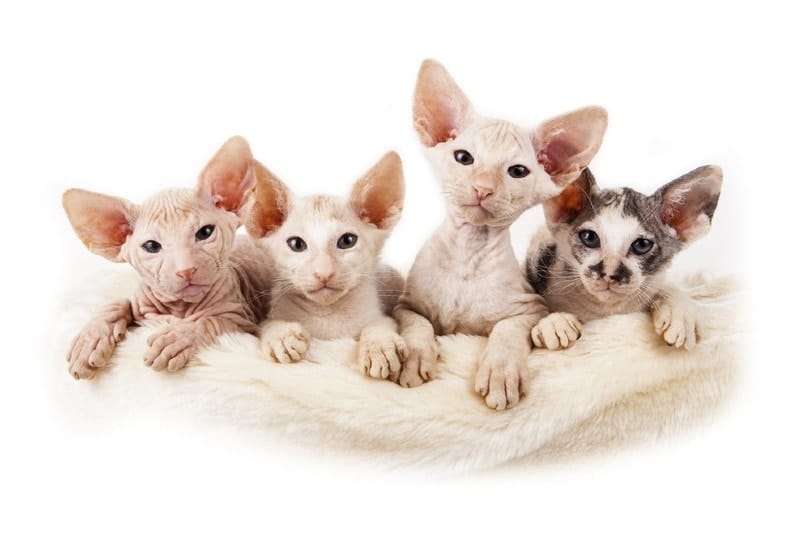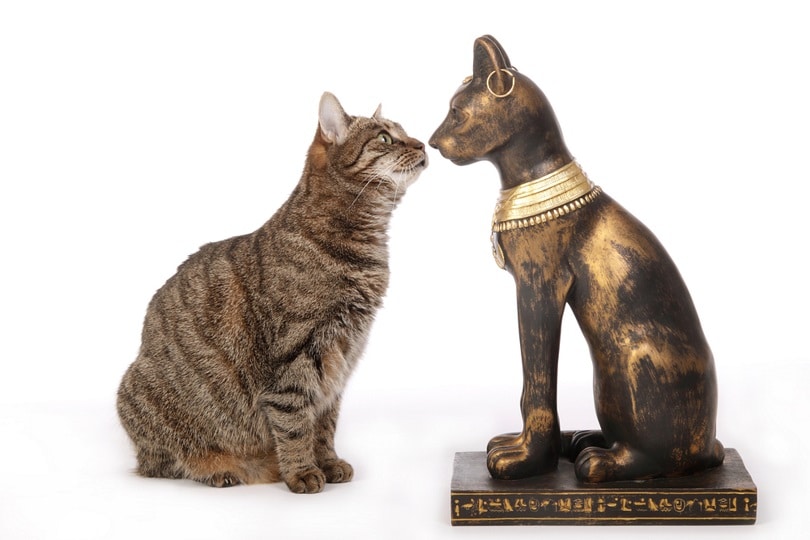With today’s modern homebuilding, technology, and pest control, it’s hard to imagine cats as the protectors they once were to people in ancient times. Before humanity had the technology and innovation we have today, like plastic containers to protect our food and solid walls and seals to keep poisonous creatures out, we relied on animals like cats to protect our homes and ourselves.
Though it might be too presumptuous to say that Egyptians worshipped cats per se, there are undoubtedly many strong ties to cats in Ancient Egyptian culture. Cats were truly loved and respected creatures, as artifacts from the times tell us today.
Egyptian Cat Creation Story
Ancient Egyptian legend says that the sun god, Ra, was once very angry with humanity. Ra sent his lion-headed daughter, Sakhmet, to the earth to rage against humanity for its crimes against him. However, he quickly realized this was a mistake, and Sakhmet was getting out of control.

To slow her down, he provided her with red-colored beer to substitute for the blood she craved. After she drank the beer, she fell into a deep sleep and became a small house cat.
- Mafdet
Mafdet was the first of cat-like Egyptian goddesses. She was often portrayed as a fierce and fearful goddess with the head of a cheetah, lion, or housecat. People in Egypt who came to her needed protection from venomous snakes and scorpions. She was seen as the protector of the home and the entire kingdom.
- Bastet
Later in Egyptian history, Mafdet was replaced by the goddess Bastet. She became the more well-known feline goddess over time. People in Egypt believed she protected the kingdom, like Mafdet, from invaders.
With the gradual domestication of cats, Bastet eventually had a softer image than before. She became more well-known as the goddess of family, fertility, and love.
- Bes
Bes did not have his own temple as many other gods and goddesses had. Rather, like a cat, he wandered around where humans were, in households. He was known as the god-protector of children. He often took on feline figures when depicted by ancient Egyptians.
Feline Special Treatment
Because of this high regard for felines, Egyptians were known to treat their house cats as well as they treated the children in the family. Seeing cats adorned with jewelry or fed like kings and queens was not unusual.
- Cat Mummies
A surprising number of Egyptians used to mummify their cats after they passed. When a household cat died, the owners would mummify them, offer them as a sacrifice at a temple, and then shave off their eyebrows to mourn for their cat until the eyebrows grew back.
When the British discovered thousands of cat mummies in excavating temples, they were reportedly exported back to Britain to be used as fertilizer. In one shipment, there were over 180,000 cat mummies. This was not an infrequent practice for Egyptians!
- Cat Crimes
Back in Ancient Egypt, if you killed a cat, even by accident, you were sentenced to death. Egyptians were passionate about protecting the cats like the cats had protected humans.
Conclusion
Cats are an important part of Egyptian history and are an important part of the history of humankind. They protected people from rats and mice that contaminated food supplies and scorpions and snakes that killed vital members of families. We have a lot to thank cats for, and it’s fascinating to see how the Egyptians did that in their own way.
You Might Also Be Interested In:
- How Were Cats Viewed by The Celts (Historic Facts & Believes)
- 100+ Egyptian Cat Names: Ideas for Enlightened & Divine Cats
Featured Image: mariesacha, Shutterstock












